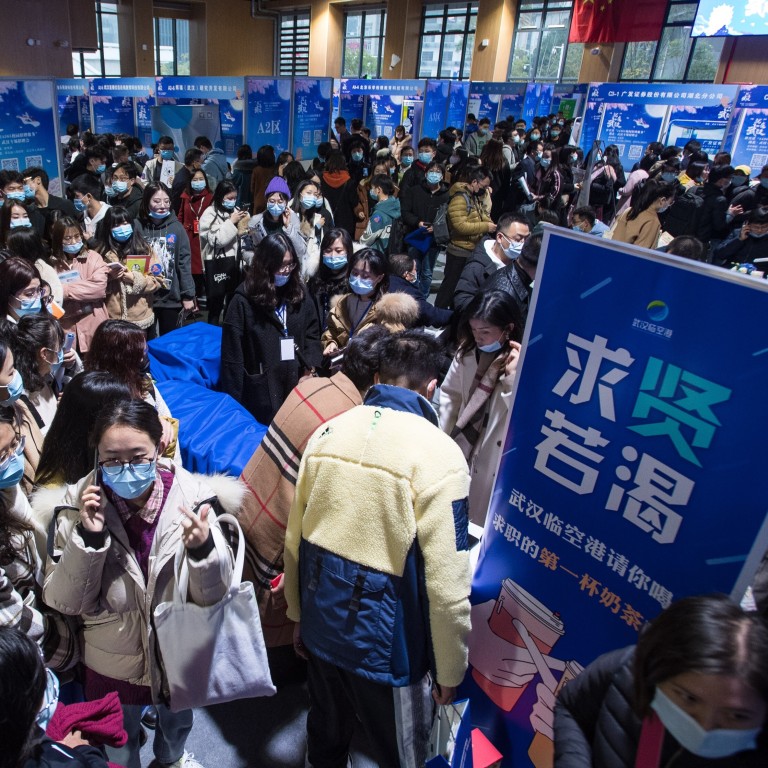
China’s army of upcoming college graduates brace to compete for jobs with a familiar rival – the class of 2020’s unhired alumni
- Competition for jobs among fresh university graduates in China looks to be even more intense next year as the coronavirus left millions of degree-holders out of work
- Ministry of Education says a record 9 million Chinese graduates will try to enter the workforce in 2021
With yet another record number of university and college graduates expected to enter the workforce next year, China’s young adults could very well find themselves in the most difficult environment ever to land jobs.
The Ministry of Education this week put that estimated total at 9.09 million Chinese – an increase of about 350,000 graduates from this year’s record high of 8.74 million.
The coronavirus compounded their struggles this year with widespread disruptions. In the spring, lockdowns across the country resulted in the cancellations of offline job fairs, while fewer jobs than usual were available after countless firms froze headcounts.
On Weibo, China’s version of Twitter, a popular comment in response to a state media post about next year’s graduate number said, “As someone from the class of 2020, I have been on the verge of collapse while looking for a job.” And a response to that noted that this year’s graduation season was far more difficult than those of previous years.
Wayne Jia, a Beijing native who is about to graduate from university in Shanghai with a master’s degree in management, said the competition for jobs had far exceeded his expectations. For instance, for an entry-level role at a local branch of a commercial bank, applicants had at least a master’s degree, and some had returned from studying at universities abroad.
“The pandemic has heavily affected the employment of graduates,” Jia said. “While the government is expanding enrolment at graduate schools to reduce the impact from the pandemic, those who graduated this year are competing with us for limited jobs. And jobs that receive policy support are mostly from state-owned enterprises. Private firms, or foreign-invested firms, are laying off people or not increasing headcounts.”
“This year is so involuted,” Jia added, using an anthropological term that became a buzzword in China this year, as it refers to a sociological phenomenon where heated competition wears everyone down as development dwindles.
In a document released in late November by the Ministry of Education, the government discussed plans to create more public service jobs, particularly positions in community service and scientific research. It also encouraged more university students to be drafted, by expanding graduate school enrolment quotas by 3,000 for those discharged from military service starting from next year.
Apart from competing with more people for jobs, Jia said, some companies’ written tests can be extremely hard. Jia is looking to land a management trainee job at a financial institute.
Chinese city hands out virtual red packets in digital yuan trial
“Every company requires you to take a personality test. Questions like: Do you think a part of you doesn’t belong to you? That cracked me up … The oddest written test I have taken was from Bank of China two months ago. They tested you on almost everything for three hours. And most of it had nothing to do with the role,” he said.
Still, Jia has been one of the lucky ones, having received six offers so far, out of more than 30 jobs he applied for and a dozen interviews he went through. For many graduates who are not from top universities, they might have a lower chance of being invited for interviews, Jia said.
The team’s analysis of civil service jobs from 2017 to 2020 found that many of them favoured men.
“We believe that the situation will continue until there is an … employment equality law,” it said.
Tang Wenshuai, a senior-year student majoring in sports education at the Shanghai University of Sport, is clearly aware of his position in the job market.
Hong Kong to offer more help to young people seeking to work on mainland
“In Shanghai, a bachelor’s degree won’t help you get a job easily, because there are so many talented people around you, and competition is so fierce,” Tang said, adding that for those students native to Shanghai, “a bachelor’s degree may get you a job. But if you are from other places, then a master’s degree is necessary”.
In his class of more than 20 people, a third are preparing to take graduate school exams in January, even though it means they will have to compete with more than 4.2 million Chinese students, also a record high.
He is still hoping to secure a position as a physical education teacher at a Shanghai school, but as a backup he has two offers waiting for him back home in the eastern province of Jiangxi.
“While one is aiming for a goal, you have to have two strings to your bow,” Tang said.
“The pandemic has significant on the labour market. This year, while the government is expanding enrolment because of the pandemic. Those who graduate this yr are competing with us for limited jobs. And jobs that receive support from are mostly SOE or COE, private firms, or foreign invested firms are laying off people or not increasing headcounts.

